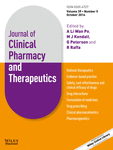Gene polymorphism and frequencies of the NPC1L1 Gene (rs2072183, rs217434 and rs217428) in Japanese patients with dyslipidemia
Summary
What is known and objective
Niemann-Pick C1-Like 1 (NPC1L1) plays a pivotal role in intestinal cholesterol absorption. Ezetimibe is known as an inhibitor for NPC1L1 and decreases concentration of low-density lipoprotein cholesterol (LDL-C) in blood. Responses of the decrease of serum LDL-C levels to ezetimibe have been reported to be different among NPC1L1 variants. However, there are still limited data concerning the genetic variation in the NPC1L1 gene, specifically, in Japanese patients with dyslipidemia. The purpose of this study is to elucidate genotype and allele frequencies of the NPC1L1 gene in Japanese patients with dyslipidemia.
Methods
Written informed consent was obtained from all participants. All patients were administered ezetimibe at the dose of 10 mg for once a day either alone or coadministered with statins. Patient's data were retrospectively obtained from their medical records. Genomic DNA was extracted from whole blood samples and analysed three NPC1L1 SNPs (rs2072183, rs217428 and rs217434) by the direct sequencing method.
Results and discussion
We found that there is a significant difference of genotype frequencies between healthy Japanese and dyslipidemic subjects in rs2072183. No significant differences were observed in rs217428 and rs217434; however, comparison of our data with literature reports suggests that there are significant differences in the frequencies of rs217428 and rs217434 between Canadian and Japanese dyslipidemic patients.
What is new and conclusion
Our study is the first report concerning the genotype and allele frequencies of the gene coding for NPC1L1 in Japanese patients with dyslipidemia. The most notable result was to demonstrate that there exists a significant difference in rs2072183 variant between healthy Japanese and dyslipidemic subjects and also found that there exists genetic variation of rs2072183 between Japanese and Canadian patients with dyslipidemia. Our results are expected to facilitate research in the proper use of ezetimibe-based mono- or combination therapies. Further studies will be required to evaluate the effects of rs2072183 on the efficacy of LDL cholesterol reduction by ezetimibe.




